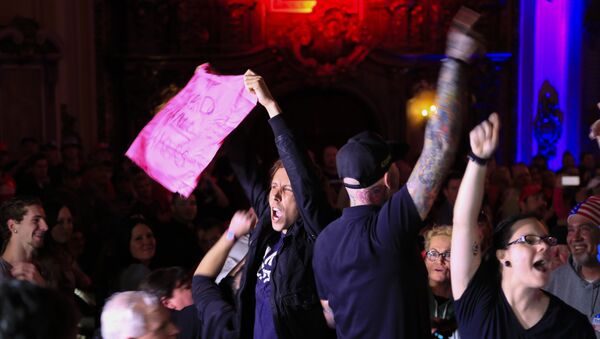Born into a mixed family of Democrats and Republicans, Mertz recalls that in the past, members of her divided household could still calmly discuss politics. Her relatives have long had starkly opposing views, but they always agreed to disagree and respected each other's opinions. But since the election of US President Donald Trump, all of that has changed, she says.
"Today we don't discuss politics with family members and friends who have different views," she tells Sputnik.
Mertz is just one of many Americans who says that the political divisions in the country are beginning to take a toll on their personal relations. As the gap between Republicans and Democrats grows wider, many Americans say they can no longer even engage in political discussions with members of the opposite party, even if those individuals are family members or close friends.
For Mertz, the trend in her own family is one that she suspects is playing out in families across the country.
"When I am among friends with similar political views, I have noticed that all of us are feeling somewhat alienated from a family member or a friend since Trump has been elected. I imagine if it is happening at my dinner table, it’s happening all over the country on some level and I believe that’s part of what Trump's legacy will be," she says.
Indeed, poll after poll has shown that Americans remain as deeply divided over Trump's presidency as they were on the day of the November 8, 2016, election. A Pew research poll published last week showed that Trump's approval rating — 40 percent — is nearly identical to his ratings shortly after his inauguration, with the results sharply polarized along partisan lines.
READ MORE: Voters Pick Nominees as Primary Vote in Midterms Elections Underway in Kansas
A separate Pew research poll conducted last year showed that political divisions in the United States reached record levels after Trump's first year in office.
Rarely are those divisions more noticeable than during election cycles. And as residents of the city of Topeka head to the polls on Tuesday to vote in the state's primary elections, many say they are saddened by the growing divide in US politics.
Editor of Grass and Grain, the agricultural newspaper serving Kansas and adjoining States, Donna Sullivan told Sputnik that she believes that social networks and traditional media are fueling such divisions.
"I think, generally speaking, where I see it the most where you will see just hate and ugliness, that will be on Facebook," Sullivan says. "The vast majority of the population are cordial and respectful to each other, but that’s not what you see on social media… I blame it more on social media than anything."
Though Sullivan believes social media is causing extreme divisions in US society, she also lays blame at the feet of the traditional American media, which she argues has become more partisan in recent years.
"I have a deep deep belief that media should be unbiased. I feel like our duty is to inform, it is not to influence," she says. "When you only get half of the facts, then you can influence how they think, and I think that’s wrong. That’s a danger to our democracy when you don't give all of the facts, or give the whole story and inform the people."
Publisher of the local weekly newspaper, the Manhattan Free Press, Jon Brake agrees that political divisions are deeper now than at any time in recent US history.
"Now there is a protest for every rally, and it’s not the way it’s been," he tells Sputnik.
Brake argues that what's missing in American politics nowadays is the ability to laugh off political differences. Humor, he says, can take the tension out of any situation, even an intense political debate with his cousin, who he says disagrees with him on nearly every issue.
"When we get together, we can talk and talk about politics and disagree on everything, but then you crack a joke and bring down the level of tension. But a lot of people can’t do that," he explains. "If you can’t laugh at it, It hurts people. It hurts families, it hurts friends."
READ MORE: US Tariffs Loom Large in Kansas Primary Election
But for many residents of Kansas, the stakes of this election cycle are no laughing matter. The primary will determine which candidates go on to represent each political party in November's general elections, which many voters see as a public referendum on Trump's presidency.
And as polls repeatedly suggest, most Americans have already made up their minds about whether Trump is a good president. And many people are forced to accept the reality that they have not reached the same conclusions about Trump as their families members and friends.
"We’ll have to see what kind of leader he turns out to be," Mertz says. "But right now, it’s very sad for those of us who are experiencing this sense of alienation from a family member or a friend."




